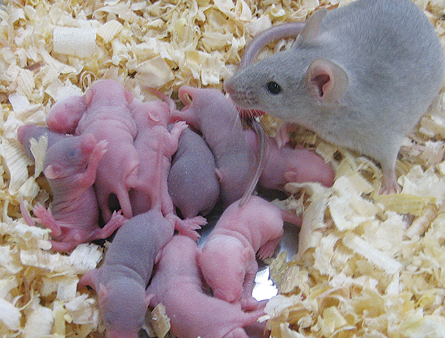This week brought big news on the stem cell front. A research group in Japan, under the leadership of Mitntori Saitou, has produced viable eggs from mouse stem cells, producing a healthy set of baby mice. Stem cells have produced eggs and sperm before, but this is the first report of viable cells yielding fertile offspring. The breakthrough is in the October 4 issue of Science magazine. A summary from Science News:
In the new study, Saitou and colleagues started with stem cells from very early mouse embryos as well as stem cells reprogrammed from fetal cells, known as induced pluripotent stem cells. Saitou’s team manipulated the activity of a few genes in the stem cells to turn them into cells that resemble precursors of gametes, as eggs and sperm are sometimes known.
These primordial germ cell–like cells, as they are called, were mixed with support cells from an embryonic ovary and then transplanted into adult mice. Once the precursor cells had developed into oocytes, the researchers pulled them out and fertilized them in the lab before implanting the resulting embryos in female mice.
The oocytes made from either type of stem cell produced mouse pups 3.9 percent of the time. That rate is lower than for primordial germ cells taken directly from mouse embryos, which the researchers found produced pups 17.3 percent of the time. Oocytes taken from the ovaries of 3-week-old mice generated offspring 12.7 percent of the time. Female pups resulting from stem cell–derived eggs grew up to become fertile adults, the researchers report.
About half of the stem–cell derived oocytes had an extra set of chromosomes, the researchers discovered. That indicates a breakdown in meiosis, the process of halving the genetic material doled out to eggs and sperm. Saitou acknowledges there is room for improvement in his group’s technique.

Comments are closed.